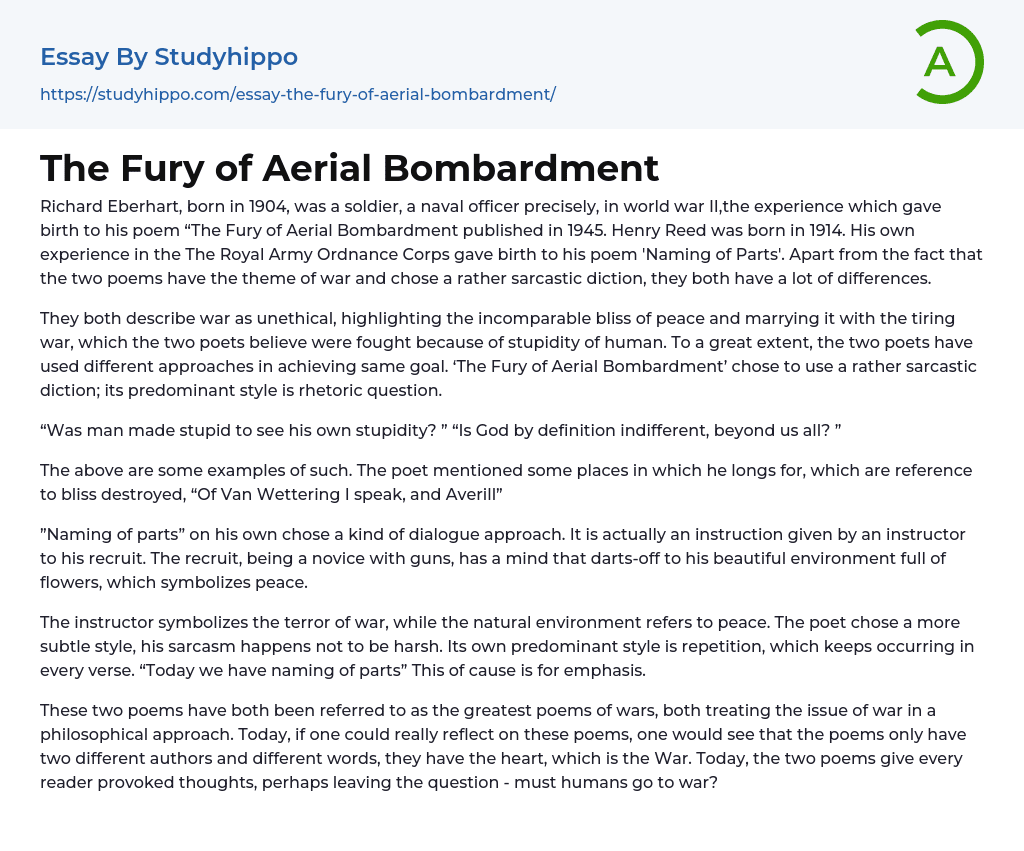Richard Eberhart, born in 1904, was a soldier, a naval officer precisely, in world war II,the experience which gave birth to his poem “The Fury of Aerial Bombardment published in 1945. Henry Reed was born in 1914. His own experience in the The Royal Army Ordnance Corps gave birth to his poem 'Naming of Parts'. Apart from the fact that the two poems have the theme of war and chose a rather sarcastic diction, they both have a lot of differences.
They both describe war as unethical, highlighting the incomparable bliss of peace and marrying it with the tiring war, which the two poets believe were fought because of stupidity of human. To a great extent, the two poets have used different approaches in achieving same goal. ‘The Fury of Aerial Bombardment’ chose to use a rather sarcastic diction; its predominant s
...tyle is rhetoric question.
“Was man made stupid to see his own stupidity? ” “Is God by definition indifferent, beyond us all? ”
The above are some examples of such. The poet mentioned some places in which he longs for, which are reference to bliss destroyed, “Of Van Wettering I speak, and Averill”
”Naming of parts” on his own chose a kind of dialogue approach. It is actually an instruction given by an instructor to his recruit. The recruit, being a novice with guns, has a mind that darts-off to his beautiful environment full of flowers, which symbolizes peace.
The instructor symbolizes the terror of war, while the natural environment refers to peace. The poet chose a more subtle style, his sarcasm happens not to be harsh
Its own predominant style is repetition, which keeps occurring in every verse. “Today we have naming of parts” This of cause is for emphasis.
These two poems have both been referred to as the greatest poems of wars, both treating the issue of war in a philosophical approach. Today, if one could really reflect on these poems, one would see that the poems only have two different authors and different words, they have the heart, which is the War. Today, the two poems give every reader provoked thoughts, perhaps leaving the question - must humans go to war?
- Boo Radley essays
- Genesis essays
- Richard iii essays
- Alice in Wonderland essays
- On the road essays
- Ozymandias essays
- The Nightingale essays
- Holden Caulfield essays
- Animal Farm essays
- 1984 essays
- A Hanging essays
- Shooting An Elephant essays
- A Tale Of Two Cities essays
- Adventures Of Huckleberry Finn essays
- Arthur Conan Doyle essays
- Brave New World essays
- Characters In Hamlet essays
- Characters In Romeo And Juliet essays
- Desdemona essays
- Diary Of A Wimpy Kid essays
- First-Person Narrative essays
- Frankenstein essays
- Heart Of Darkness essays
- Jane Eyre essays
- Jay Gatsby essays
- King Duncan essays
- Librarian essays
- Little Red Riding Hood essays
- Lord Of The Flies essays
- Silas Marner essays
- The Cask Of Amontillado essays
- The Catcher In The Rye essays
- The Crucible essays
- The Handmaid's Tale essays
- The Reader essays
- Virgil essays
- Wuthering Heights essays
- Candide essays
- Castle essays
- J. D. Salinger essays
- Ulysses essays
- Ethan Frome essays
- In Cold Blood essays
- Outliers essays
- Tuesdays With Morrie essays
- The Art of War essays
- Wife of Bath essays
- Huckleberry Finn essays
- The Lady With The Dog essays
- Great Expectations essays




